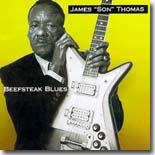|
James "Son"
Thomas
Beefsteak Blues
Evidence Records |

James “Son” Thomas didn’t just sing the
blues, he lived them. Born in Eden, MS in 1926,
Thomas worked as a sharecropper and a grave digger,
he was shot by an ex-wife, he suffered from
emphysema, a brain tumor, and epilepsy, and he was
severely burned when he fell on a space heater. Any
one of those conditions would lead most men not to
sing the blues, but maybe to step out into oncoming
traffic. Thomas persevered through it all, even
becoming a sculptor and earning worldwide fame for
his replicas of human heads, which used hair from a
local barber and teeth from a local dentist.
As a youngster, Thomas
was taught to play guitar by his uncle and his
grandfather, and he was influenced by Arthur “Big
Boy” Crudup and Elmore James. He even played James’
guitar once when James came through town with Sonny
Boy Williamson. Frustrated with sharecropping,
Thomas moved his family to Leland, MS, where he, his
wife, and ten children lived in a 15’ x 45’ house.
He began to play with local musicians like Eddie
Cusic and Little Son Jefferson at weekend house
parties, where the attendees loved his driving
rhythms. He played crowd favorites (like “Good
Morning, Little Schoolgirl,” “Rock Me Mama,”
“Standing At The Crossroads,” “Big Fat Mama,” and
“Catfish Blues”) as well as his own songs.
Eventually, he was
“discovered” and recorded by William Ferris and
became one of the focal points of Ferris’ book,
Blues From The Delta. Afterward, he became a
favorite at blues festivals all over the world. He
also appeared on Charles Kuralt’s “On The Road” TV
series, and also in National Geographic, as well as
several documentaries of the ’60s and ’70s. He
performed for President Ronald Reagan at the White
House in 1982. For many years, he was a regular
performer at the annual Delta Blues Festival at
Freedom Village, just south of Greenville, MS, where
I was fortunate enough to see him in the early ’90s.
Thomas was recorded
sporadically over the years and Beefsteak Blues
(Evidence) ranks with his best work. These songs
were recorded at various times and locations. Most
of the cuts were recorded live during the American
Folk Blues shows in Germany in the early to mid
’80s. There were also two songs recorded in Leland.
All were previously released on the L+R label.
Nearly all feature Thomas performing solo on guitar,
but there is one cut (“Rock Me Mama”) that features
accompaniment from Cleveland “Broomman” Jones on
broom bass, which involves spreading dirt on the
floor and scraping a broom handle across it. Another
track (a plugged-in, surprisingly urbane “Stormy
Monday Blues”) includes Chicago bass player J. W.
Williams and drummer Mose Rutues, Jr.
Thomas was a highly
rhythmic guitarist who could boogie with the best of
them on tracks like “Rock Me Mama,” “Highway 61
Blues,” or play some impressive slide guitar on
“Standing At The Crossroad,” or get down and dirty
with Delta classics like “Hoochie Coochie Man/Tune
In Next Time,” “Good Morning, Little Schoolgirl,”
“Big Fat Mama,” or with two different versions of
the Delta standard “Catfish Blues,” one fairly
straightforward and the other an “unexpurgated”
version which is probably closer to the version he
played in the juke joints. His voice was different
from most Delta bluesmen, smoother, almost a croon
at times as opposed to the rough and ragged vocals
often heard with performers of his era.
Thomas’ tough life
finally caught up with him in 1993 and he passed
away at 66 after struggling with heart problems and
a stroke. The headstone on his grave, paid for by
musician John Fogerty, includes a verse from
“Beefsteak Blues” as an epitaph. Only one of his
children carried on his musical tradition; his son
Pat, who recently released his first disc, His
Father’s Son. Not only did Pat remain faithful
to his father’s music, he is a sculptor, too.
James “Son” Thomas was
one of the Mississippi Delta’s most beloved
treasures. For those not familiar with his talents,
Beefsteak Blues is an excellent place to
start.
--- Graham Clarke